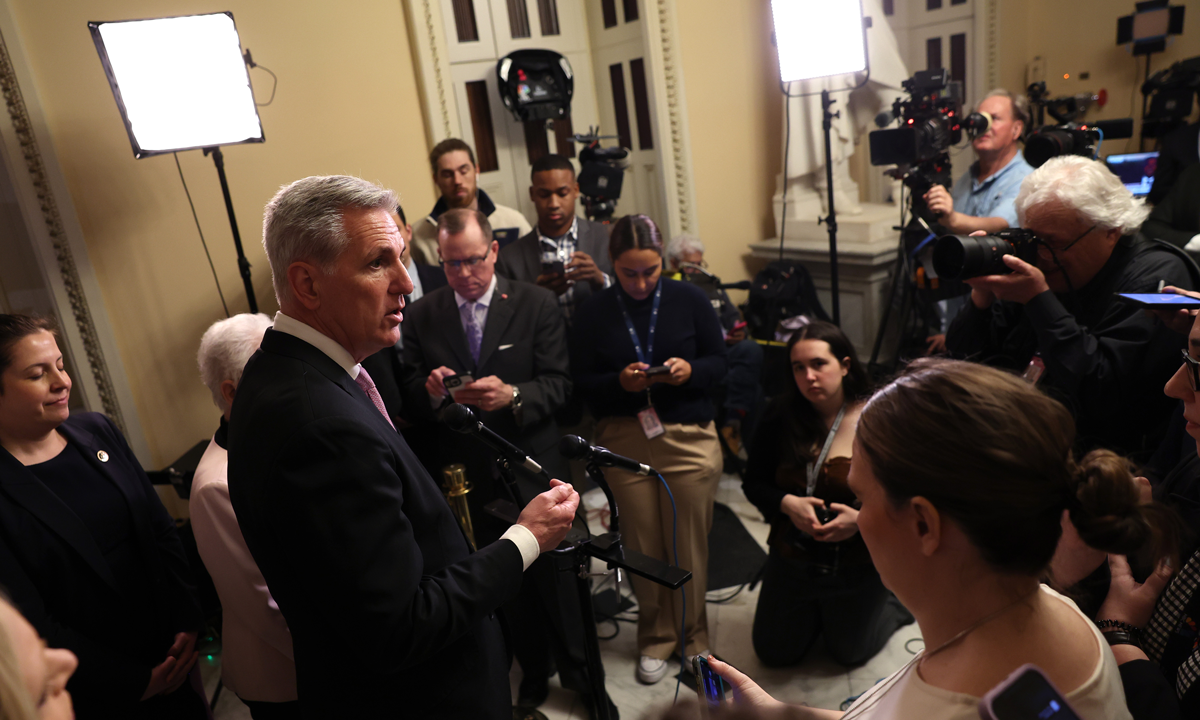GOP Parents Rights Bill Passes House, But Faces Likely ‘Dead End’ in Senate
Even if it’s defeated, the measure is expected to be a cornerstone of the Republican agenda heading into the 2024 elections

Get stories like these delivered straight to your inbox. Sign up for The 74 Newsletter
The GOP-led House on Friday passed a bill that would force schools to offer parents far greater transparency about what their children learn, but that Democrats argue could lead to book bans and discrimination against LGBTQ students.
The Parents Bill of Rights passed 213 to 208, with five Republicans voting against it.
“Teachers unions and education bureaucrats worked to push progressive politics in classrooms while keeping parents in the dark,” Rep. Virginia Foxx, chair of the House education committee, said during Thursday’s floor debate. “The Bill of Rights …aims to end that and shine a light on what is happening in schools.”
But with Majority Leader Chuck Schumer tweeting that it would face a “dead end,” the legislation is unlikely to get far in the Democratic-controlled Senate.
House Democrats — who renamed it the “politics over parents act” — say the legislation duplicates existing policies and rights and would micromanage how local schools interact with families.
“This legislation has nothing to do with parental involvement, parental engagement, parental empowerment,” said Democratic Leader Hakeem Jeffries of New York. “It has everything to do with jamming the extreme MAGA Republican ideology down the throats of the children and the parents of the United States of America.”

For years, educators who work with families have longed for this level of national attention to the role parents play in their children’s education. But some experts called the Republican approach adversarial and heavy-handed. Republicans view parents rights as a cornerstone of their Commitment to America agenda and are expected to carry the issue into next year’s elections. Even if the House bill dies in the Senate, the debate likely won’t.
Family engagement experts, meanwhile, say they’re hoping for a less-partisan discussion about building trust between educators and parents.
“If we’re creating bills that pit parents against teachers, kids lose,” said Vito Borrello, executive director of the National Association for Family, School and Community Engagement.
Democrats, he said, have sent the wrong message at times, pointing to former Virginia gubernatorial candidate Terry McAuliffe’s comment that parents shouldn’t tell schools what to teach and the National Education Association’s tweet that educators know “better than anyone” what students need. But the GOP legislation, he said, approaches parents rights from a “vigilante perspective.”
Among other provisions, the bill would require schools to post curricula online, provide lists of all books and other reading materials in the library and notify parents of the affiliations of any outside speakers at school events.
Prior to the vote, the House approved several amendments, including one that would make schools disclose when they eliminate any gifted and talented programs and another requiring educators to turn over videos or recordings of any “violent activity” at school. Another stating that parents have a right to “timely notice” of a cyberattack against a school that could expose student or parent information received overwhelming support from both parties, passing 420 to 5.
But amendments that would have eliminated the Department of Education, sent Title I funds directly to families to use for private schools or homeschooling, and block grant education funding to the states failed.
Dozens of education organizations, including AASA, The School Superintendents Association, the NAACP and The Education Trust, endorsed an alternative bill, led by Rep. Suzanne Bonamici of Oregon, that emphasized inclusion, high-quality schools and a well-rounded education. But the bill failed, 223 to 203, with one Democrat, Sharice Davids of Kansas, voting against.

Charles Barone, vice president for K-12 policy at Democrats for Education Reform, said the Senate would likely let the bill GOP die and not try to negotiate a compromise. The question is whether passage of the bill gives Republicans momentum going into the election next year.
“As a general election strategy, it’s pretty ill-advised,” Barone said. “There is a set of voters that buys their line of argument, but that set is pretty narrow. This is such an old playbook.”
The Biden administration has already expressed its disapproval. “The administration strongly supports actions that empower parents to engage with their children’s teachers and schools, like enabling parents to take time off to attend school meetings,” the White House statement said. “Legislation should not politicize our children’s education. It should deliver the resources that schools and families actually need.”
Gender identity provision
The administration’s statement drew attention to a provision that it said would make LGBTQ students feel less welcome. The legislation would require schools to get parental consent if a student wants to officially change their gender markers or pronouns or use facilities inconsistent with the sex they were assigned at birth. During the debate, Foxx clarified that the bill would not require counselors or teachers to “out” students if they discuss such topics in confidence.
During the education committee’s mark-up of the bill March 8, several Democrats said not all trans students have supportive parents and that a “one-size-fits-all” federal mandate could put already-vulnerable students at a greater risk.
But Republican Tim Walberg of Michigan, who pushed for notification, said that informing parents of their child’s request would alert educators to potential maltreatment.
“When a child goes on a field trip or fails a test … their parents are told and often required to sign some sort of acknowledgement,” he said. “Why should the small things require notification but something as significant as a child’s pronouns or a change in accommodations be withheld from the people who raise them care for them?”
Civil rights advocates argue that even if the bill fails in the Senate, the House’s move still harms trans students.
“More trans kids are going to wake up reminded that there are leaders in this country who don’t want them to be safe,” said Liz King, senior director of the Education Equity Program at the Leadership Conference on Civil and Human Rights.
The GOP’s bill is inspired by laws that have already passed in several states, like Florida, that allow parents to contest books used in school lessons and libraries and prevent discussion of sexual orientation and gender identity in the early grades. Gov. Ron DeSantis now plans to apply those restrictions to all grades.
Melissa Erickson, executive director of Florida’s Alliance for Public Schools, said the laws are “exacerbating the flood from teaching” and don’t reflect the concerns of most parents. She doesn’t see the need for a national version.
“I thought education was left to the states,” she said. “Parents have a right to be heard, but there is a difference between being heard and being accommodated.”
This week’s events in the nation’s capital drew 75 representatives from the National Parents Union, who lobbied against the GOP bill and in favor of Bonamici’s amendment. They met with U.S. Department of Education officials and they visited every House member’s office.
But their highlight was getting a shoutout from New York Democratic Rep. Alexandra Ocasio-Cortez, who cited their latest poll results. The survey showed parents support teaching students about diversity but reject policies that would allow one parent to have curriculum removed for all students.
“We’re all gripping our seats,” said National Parents Union President Keri Rodrigues. “When we got up to leave, the Democrats stopped on the floor and waved at us. For these parents, it was a powerful moment.”
Get stories like these delivered straight to your inbox. Sign up for The 74 Newsletter

;)
